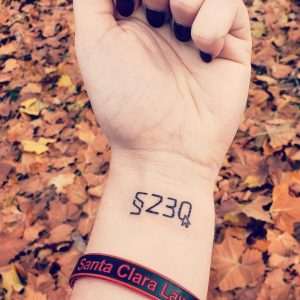Breach of Contract/Promissory Estoppel Claims Bypass Section 230 But Fail Anyways—Yue v. Miao

Miao ran a Chinese language social media site called “bian-wang.com.” Yue operated a rival service. Miao allegedly secretly poached some of Yue’s customers. Miao also allegedly copied one of Yue’s posts on the rival and reposted it on bian-wang, which generated a lot of discussion. Yue created an account on bian-wang to engage with the article as well.
Miao’s TOS contained “Rule #2”: “Blog articles shall not be censored, filtered or blocked, but any blog article that contains a Netizen’s user ID in its subject shall be immediately deleted once being reported (same applies to comments).” Yue successfully invoked Rule #2 to Miao to remove some critical posts.
The griefers came back, however, and allegedly Miao “actively participated in the attacks and encouraged the attacks” against Yue. Yue again requested Miao’s intervention but apparently wasn’t satisfied. More criticisms of Yue kept coming. Eventually, Yue sued Miao for contract breach, “tortious breach of implied covenant of good faith and fair dealing,” promissory estoppel, intentional infliction of emotional distress, and CA B&P 17200. Citing Section 230, the court grants Miao’s 12(b)(6) motion to dismiss the IIED and part of the 17200 claim.
Unfair Competition. “while most of Yue’s claims allege injury from the offensive posts of other users on bian-wang.com, Yue’s Unfair Competition Law claim also alleges injury caused by Miao’s own “vicious and immoral attacks” against Yue. Thus, to the extent Yue seeks to hold Miao liable for content Miao created himself, the Communications Decency Act provides no immunity against Yue’s Unfair Competition Law claim.”
Breach of Contract/Promissory Estoppel. The court adopts the Ninth Circuit’s Barnes v. Yahoo standard excluding these claims from Section 230:
If, as Yue alleges, Miao had a contractual obligation to Yue to remove offensive content from bian-wang.com, or if Miao made a legally enforceable promise to Yue to remove the content, Miao cannot now use the Communications Decency Act to avoid an otherwise lawful obligation….the statute is meant to protect computer service providers in their role as publishers….
the behavior Yue most directly seeks to hold Miao accountable for is Miao’s purported failure to adhere to his obligations as a party to a contract, not for Miao’s failure to act as a responsible publisher of third-party content….if Miao obligated himself under contract law principles to remove offensive content, to provide him blanket immunity from his own promises would frustrate the purposes of the Act
Cites to Obado, Herrick v. Grindr, Klayman v. Zuckerberg.
The breach of contract and promissory estoppel claims fail anyways because Rule #2 “appears merely to be a statement of Miao’s intent on how he would moderate users’ behavior on the website. The rule creates no obligation on the part of Miao or the users, nor does it manifest any promise that is actionable in the event of a breach.”
On consideration of the magistrate report, the district court judge implicitly emphasizes how Barnes’ successful allegations were rare: “Yahoo made specific promises to the plaintiff about specific actions it would undertake as to specific postings. This is immensely different from general statements of intent about governance policies for an entire website….[Rule #2] serves to warn posters articles will be deleted, not to promise to reporters the post will be deleted. It is inherently unreasonable for a reporter to rely on this to create a contractual obligation.” This is the same basic conclusion that Noah v. AOL reached in 2003.
IIED/17200. “Yue’s premise for Miao’s liability as to this claim is that Miao intentionally injured Plaintiff by refusing to delete the offending posts by third parties. Thus, Yue seeks to hold Miao liable for actions that are “traditional editorial functions—such as deciding whether to publish, withdraw, postpone, or alter content.” Accordingly, Yue’s claim for intentional infliction of emotional distress is barred by the Act. Similarly, to the extent Yue’s Unfair Competition Law claim is premised on Yue’s failure, in the role of publisher, to delete offending posts by third parties, the Communications Decency Act bars the claim.”
The 17200 claim fails anyways for lack of standing.
On consideration of the magistrate report, the district court judge said that Yue limited his concerns to Miao’s posts. That doesn’t help the IIED claims because “insulting online barbs are neither extreme nor outrageous, as they seemingly have become a mainstay in modern society.”
Case citation: Yue v. Miao, 2019 WL 5872142 (D.S.C. June 27, 2019). On November 19, the district court judge adopted the magistrate report with some substantive comments. Yue has appealed the case to the Fourth Circuit.
Pingback: News of the Week; December 18, 2019 – Communications Law at Allard Hall()